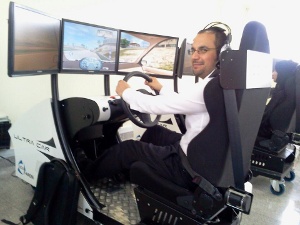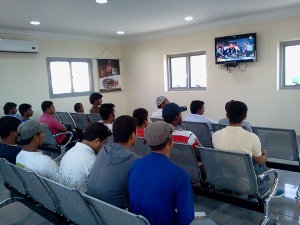Shortly before it caught fire, I visited the Villagio mall, one of the three largest in Doha. As far as I understand, it is a copy of a place in Las Vegas that intends to give the visitor the impression that you are in an "Italian village", including Gucci stores, a Venetian channel with gondoliers, etc.
 I also had the opportunity to meet the (admirable) crazy cat ladies from "Cats in Qatar". Doha is full of abandoned cats. One of them is in this picture; we found her in the -3 parking of Tornado Tower, the maintenance people from the building took care of her for a few days and for now I am taking care of her.
I also had the opportunity to meet the (admirable) crazy cat ladies from "Cats in Qatar". Doha is full of abandoned cats. One of them is in this picture; we found her in the -3 parking of Tornado Tower, the maintenance people from the building took care of her for a few days and for now I am taking care of her.
Fortunately my immigration paperwork is done. This is a record. In Italy my resident permit took 7 months. In Spain it took 3 months, without considering the time when they expelled me from the country. Here it was only 5 weeks.
 It is evident that the Qatar Foundation as an employer has a lot of influence. They put us in front of the queues at every step, and that saves entire days of paperwork. Queues are never well arranged, and often, you can not trust they will be respected.. In my medical checkup my queue was reversible. You could be at the beginning or at the end, depending on the decision of the security guard.
It is evident that the Qatar Foundation as an employer has a lot of influence. They put us in front of the queues at every step, and that saves entire days of paperwork. Queues are never well arranged, and often, you can not trust they will be respected.. In my medical checkup my queue was reversible. You could be at the beginning or at the end, depending on the decision of the security guard.
Through all the city you can hear the speakers of the mosques calling to prayer. SpeakerS, mosqueS, plural. From here I can hear at least three. To me it sounds like a cacophony of Gregorian singing..
Being without Fabiola is weird, I have had some critical days in which I don't even want to eat, specially on weekends. My work mates are practically all foreigners, many from Egypt and India. We hang out together a lot. I have gone a couple of times to the movies ... in sex scenes, they blank the screen and you can hear only the audio.
A little problem derived from the local customs is that in shopping malls and restaurants there are areas for "families". The meaning of this is that men alone can not enter these areas. This discriminates obviously against the poorer immigrants, because to bring your family here you have to have a well-paid job.
* * *
I met my neighbors, a British couple absolutely lovely, who believing I was not at home took my garden furniture. But they gave it back ;-) They are very nice, we went for a brunch to the Ritz-Carlton, where there is a free buffet and a free bar of sparkling white wine if you want -- meaning, the perfect place for getting drunk on a Friday noon (!) Here people work from Sunday to Thursday and Friday, specially Friday morning, is the most relaxed time of the week.
* * *
 To get my driver license I have to do a mini-course of 12 sessions. I did not like the idea much at the beginning, I had hoped to just exchange my Chilean license for a Qatari one and maybe if I had insisted enough I would have done that. But the course has not been bad. The first two classes are in a simulator, which is fun because in the simulator everybody is very imprudent, they don't respect traffic lights, etc. I killed a guy in the simulator, who practically waited for me to get closer to throw himself to the street. But I saved a camel in the "country" scenario.
To get my driver license I have to do a mini-course of 12 sessions. I did not like the idea much at the beginning, I had hoped to just exchange my Chilean license for a Qatari one and maybe if I had insisted enough I would have done that. But the course has not been bad. The first two classes are in a simulator, which is fun because in the simulator everybody is very imprudent, they don't respect traffic lights, etc. I killed a guy in the simulator, who practically waited for me to get closer to throw himself to the street. But I saved a camel in the "country" scenario.
Then there are the practical lessons where you get ready for the exam (traffic signs and practical exam with L-parking, parking in a tight spot, and on-the-road test). I think I will get a PhD in L-parking. I am also practicing a lot defensive driving.
It is worth doing it. People are very aggressive when driving and they do stuff I haven't seen elsewhere. For instance, back from work a colleague who was giving me a ride cut in front of a Land Cruiser, unwillingly. Later the Land Cruiser came in front of his car and stopped suddenly, to make us crash against him. Fortunately, the other people in the car warned my colleague that this would happen, because Qataris know that in a trial between them and a foreigner, the foreigner always looses.
 The instructors in the driving school work 10 hours a day and I think mine is always about to throw himself out of the car window out of boredom. When instructors are not giving lessons, they wait in a room with air conditioning and watch wrestling matches.
The instructors in the driving school work 10 hours a day and I think mine is always about to throw himself out of the car window out of boredom. When instructors are not giving lessons, they wait in a room with air conditioning and watch wrestling matches.
* * *
Last week one of my colleagues was speaking with the son of someone from the office, who was complaining about bullies in school. My colleague told the kid that he had to do like Napoleon, who studied a lot in school to be better than the bullies. His answer:
-- I am sorry sir, that is a bad example. I don't want to be like Napoleon.
-- Why?
-- Because I am Egyptian.